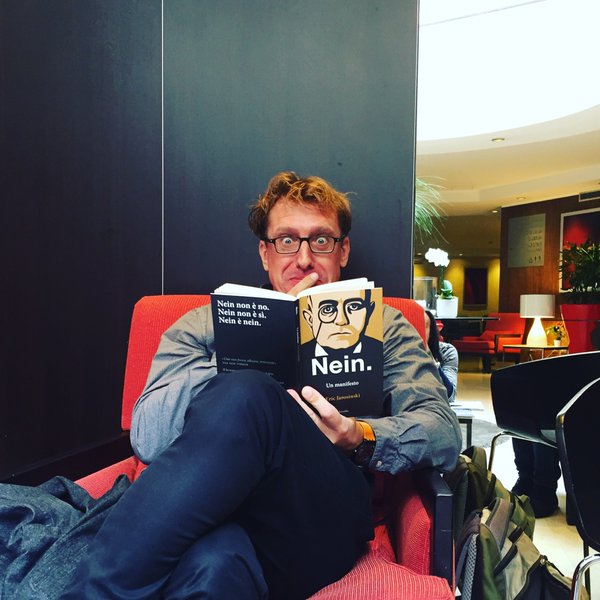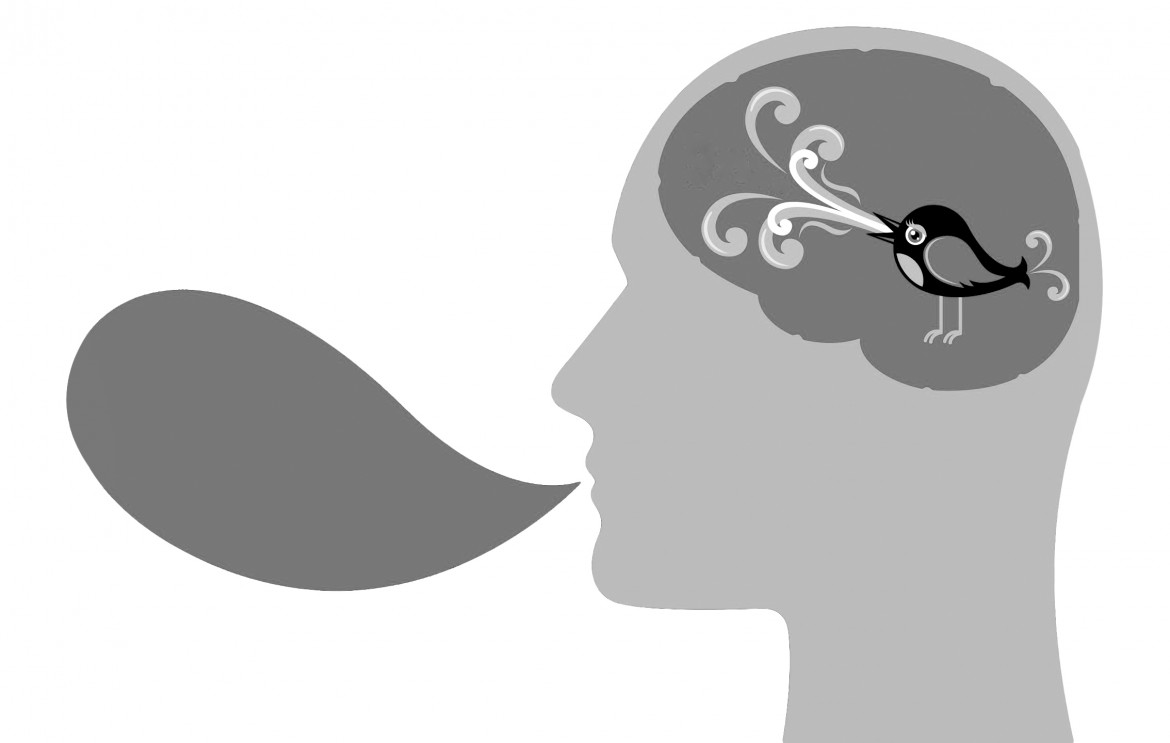Eric Jarosinski: the rock star philosopher of Twitter
Nein An interview with Eric Jarosinski, the American philosopher who became a star on Twitter and the author of the book of aphorisms, "Nein."
 Eric Jarosinski in Rome
Eric Jarosinski in RomeNein An interview with Eric Jarosinski, the American philosopher who became a star on Twitter and the author of the book of aphorisms, "Nein."
“I started writing when I was no longer able to write,” says Eric Jarosinki, who is a professor of German literature in the U.S. and oriented to the life of the failed intellectual.
Like so many others, he discovered Twitter and started writing aphorisms and jokes based on paradoxes and puns. The meaning does not matter; what counts is the rhythm, irony and the so often used Nein. On Twitter, where the feelings of the human tide wander freely, often fed by ego and exhibitionism, Jarosinski’s “no” broke through. His followers increased alongside his fame.
An article in The New Yorker magazine catapulted him to the general public. He began to work with newspapers and published Nein, a book of aphorisms. He has become a global success, reaching out of the network and joining the discussion on philosophy, on the fate of network culture, on politics.
Some journalists compare Jarosinski’s aphorisms to Theodor W. Adorno’s writings. Others compare him to Friedrich Nietzsche, or to the fragmentary style of Walter Benjamin. None of this is right, says the person concerned. It is simply his critical attitude condensed into 140 characters, which is the constraint imposed by the social network and used by Jarosinki for the purpose of clarity and effectiveness.
Now he has thousands of Twitter followers and a line of Nein merchandise. Like a rock star, he began his tour.
What did you expect would come out of your Twitter activity? Were you ready for this kind of success?
I expected nothing, to be honest. I wanted to write regular philosophical texts, but I could not do it anymore. I had a sort of writer’s block. At the beginning, I was writing on Twitter for myself. Then I began to have an audience of German journalists who were on their computers at the same time I was online. We can therefore say that it became a media phenomenon tied to the old way of doing journalism. At this point, the personal diary that I was building became something else. The subjects, the themes that I faced were let “free.” I was not following a program defined in advance, but I began to pay more attention to the reception.
You have a philosophical background that echoes in your tweets. Does it mean that the only online format for philosophy is the aphorism?
I do not think at all of discussing philosophy. Simply, I think I can make a contribution to the teaching of philosophy. However, I love several writers who chose the aphorism format for their philosophizing. Maybe I was influenced by the shape of their choice to express ideas and thoughts. In a few words, I asked myself how a concept can be communicated in simple terms and with a clarity that is often ignored by many philosophers.
https://twitter.com/new_toon/status/658928438309449728
Many philosophers state that their output is not philosophy…
It is an interesting idea, and it relates to what I’ve done and what I do on the internet. I know well the difference between a play on words and the long, tiring process leading to the definition of a concept or the assessment of a typical philosophical theme. I started playing with words, and I continued to play. Over time, when I came out of that diary, I set a goal: I wanted to translate philosophical themes in a language that can attract the attention of a wider audience, not limited to the academic circles where often philosophy is confined. The role I assigned myself, then, is the translator. I do that using wordplay.
As an author, you challenge the German philosophical culture with a disenchanted online approach. In fact, there is no attitude of rejection of the internet, as an environment that denies the possibility of developing an “authentic” thought, in your aphorisms. But conversely, there is no apologetic propensity of the possibilities offered by online communication…
I frequented the German philosophical world for more than 20 years. Here, too, chance has played a major role, because I approached the German philosophers by chance, as I did with Twitter. They were 20 very intense years. I fell in love with German philosophy, then I hated it, finally I reached the conclusion that I could, perhaps, know it. So I made the acquaintance of the other.
I invite all my students to experience it, because knowing the other is inspiring. After 20 years in Germany, I realized that I had reconciled with my being American, which I had struggled with before. In fact, I almost fled from my country. I went back home enriched, changed, transformed, grown.
With the rising number of followers, have you changed your messages? Has success influenced your message?
I am more careful in the process than before. What I miss the most now is the loss of the personal input in my tweets.

It has already changed a lot. At the beginning, I was involved in philosophy, German studies, I got tired of this type of academic work and I tried to give the account what the Americans call a “voice,” a style. And this voice quickly became more political. This inexorably led to two advantages: I can deal with issues that interest me, and I got empowered by the increasing online visibility. This power allows me to direct my audience to things that I think are important. It is known that in the academic world, the connection between theory and practice is missing. In the past I was engaged with trade unions, I was an activist and I wanted my principles to be always evident, without becoming dogmatic.
Evolving toward politics is not a good thing for business. Expressing a critical point of view of the political establishment does not make you rich, but I was not looking for financial success at the beginning. As a result, my “audience” has helped me to make a living lecturing and taking part in seminars. The decision to politicize the tweets does not mean, however, to take sectarian positions. I often check the profiles of my followers; there are many who seem to have a clear political position that does not match mine. I assume that there may be points of conflict, but I’m happy. For me, the profiles of those who follow me are more important than the number of followers.
How does the conformism in Twitter affect your interaction with the public?
I could have written this book using writing bits and more popular and recognized topics, but I wanted to find a way to say some important things that would reflect myself after 10 years. This book is written in a form which is missing in today’s philosophy. It oscillates between the joke, a play and poetry. The rhythm binds everything together. In the German translation, for example, I worked closely with the translators who were especially attentive to what I was saying, but for me, the most important thing was the pace. This was the real challenge of the Frankfurt School at the beginning: They used the expression “leave a message in a bottle.”
The form, rhythm and irony are the shape of the bottle. The challenge is to put the message inside. It works especially in journalism, and success lies in combining the old and the new, just as did Walter Benjamin, who was not afraid to compete with mass culture and the technology that enabled the mass distribution of high culture. Journalism perhaps can be a vehicle of this new form of expression.
Will your presence on the internet change with the monetization of your success with this book and other marketing activities?
We tend to think that those who have many Twitter followers are very successful, but this does not translate into money, even for Twitter itself. I use it like a band does, I make money going on tour, and musicians have understood this mechanism well. So I want to travel, but I do not want to make regular readings, because they would be bad poetry readings. So, I use a trick: I stand with my back to the audience, serious and precise, and make jokes to a video that makes jokes. I’m an academic and the videos create a short circuit that works well. I really like writing funny things, but I’m not an actor.
The internet is the place to try to give shape to reflections on the world, knowing that building up an audience, a public, is a real job. The web, however, accepts everything. Conformist positions and unconventional positions. Consensus to the dominant thought and dissent, even radical departure from the status quo. What matters is that the flow does not ever stop. What do you think?
Contradiction is an integral part of my online persona. I can say that one of my intentions at the beginning of this adventure was to build solidarity with a critical point of view, without, I repeat, any dogmatic claim. I started from the assumption that we had lost everything and there was nothing else to lose. I just wanted to express my adherence to certain principles. If this is understandable from the individual point of view, this recall of principles on the public dimension is inherent to the ethos, that is, to public ethics. But I wanted to speak to a community of those who don’t have any community to belong to.
Online, there is a general, generic public. I turned and I turn to those who share a critical view of reality, but without ever falling into jibes or frontal attacks to those who express a rather different point of view. Social media is the kingdom of the personalization of criticism. Online, instead of attacking positions different from their own, it is preferred to insult the person.
However, I choose to proceed differently: This is my position, what do you think? As I said, I think of a community of those who do not belong anywhere, that is, of those who have already lost everything.
As for the network, I do not think the internet will change the reality. I was an activist. I used the phone, mailing lists, text messages and the first social media to publicize sit-ins, demonstrations. But I am convinced that without a vis-à-vis relationship, you’ll never convince a person to participate in a demonstration. If this live contact is missing, you can collect a lot of “likes,” or your tweet may be retweeted, but no one will engage directly. Among my followers, there are committed journalists, activists, theorists, media critics, but this community of individuals is relegated to the network. To change the reality we need much more than a “like.”
- Originally published in Italian at il manifesto on Oct. 27 2015
https://twitter.com/NeinQuarterly/status/657249098681159680
I consigli di mema
Gli articoli dall'Archivio per approfondire questo argomento
